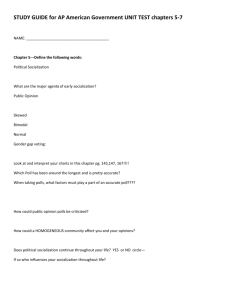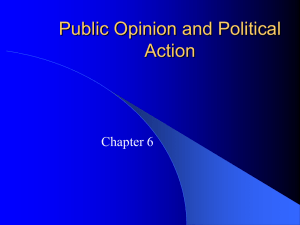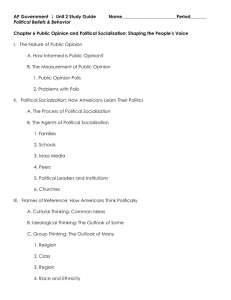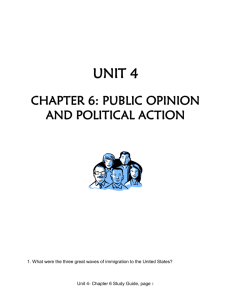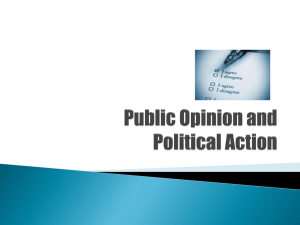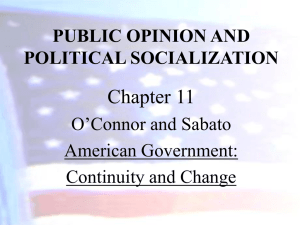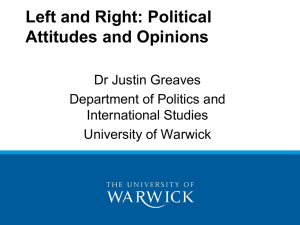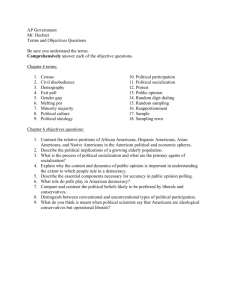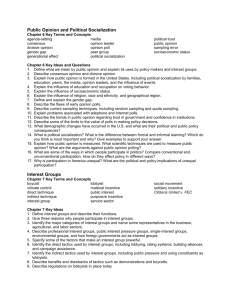ap government - Cloudfront.net
advertisement
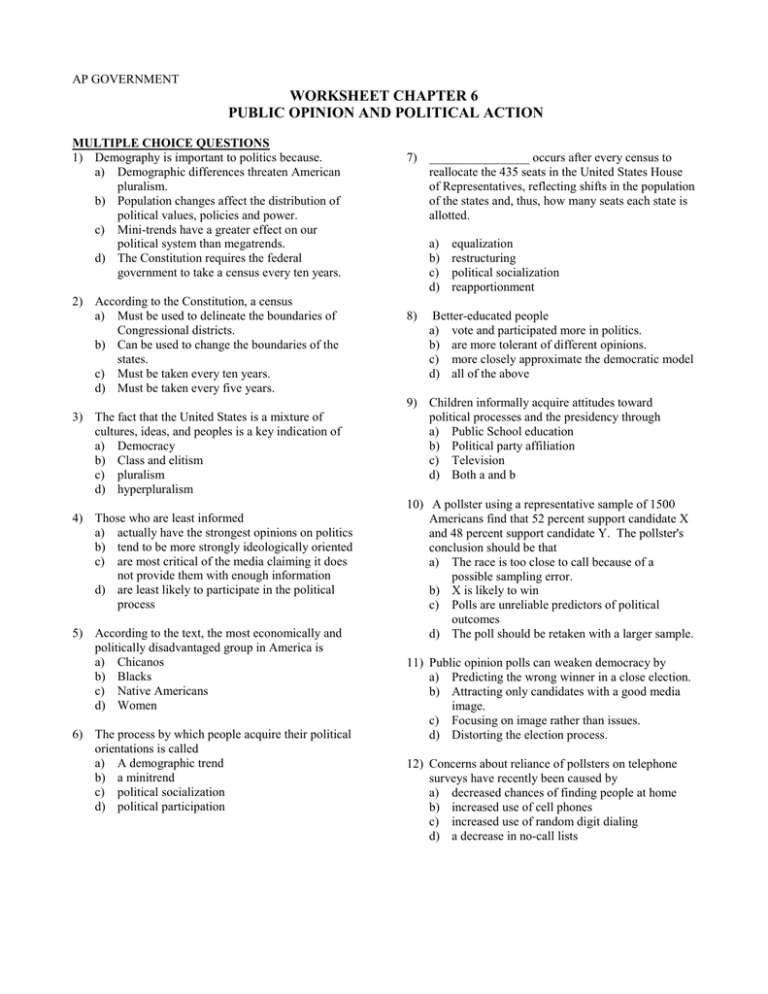
AP GOVERNMENT WORKSHEET CHAPTER 6 PUBLIC OPINION AND POLITICAL ACTION MULTIPLE CHOICE QUESTIONS 1) Demography is important to politics because. a) Demographic differences threaten American pluralism. b) Population changes affect the distribution of political values, policies and power. c) Mini-trends have a greater effect on our political system than megatrends. d) The Constitution requires the federal government to take a census every ten years. 2) According to the Constitution, a census a) Must be used to delineate the boundaries of Congressional districts. b) Can be used to change the boundaries of the states. c) Must be taken every ten years. d) Must be taken every five years. 3) The fact that the United States is a mixture of cultures, ideas, and peoples is a key indication of a) Democracy b) Class and elitism c) pluralism d) hyperpluralism 4) Those who are least informed a) actually have the strongest opinions on politics b) tend to be more strongly ideologically oriented c) are most critical of the media claiming it does not provide them with enough information d) are least likely to participate in the political process 5) According to the text, the most economically and politically disadvantaged group in America is a) Chicanos b) Blacks c) Native Americans d) Women 6) The process by which people acquire their political orientations is called a) A demographic trend b) a minitrend c) political socialization d) political participation 7) ________________ occurs after every census to reallocate the 435 seats in the United States House of Representatives, reflecting shifts in the population of the states and, thus, how many seats each state is allotted. a) b) c) d) 8) equalization restructuring political socialization reapportionment Better-educated people a) vote and participated more in politics. b) are more tolerant of different opinions. c) more closely approximate the democratic model d) all of the above 9) Children informally acquire attitudes toward political processes and the presidency through a) Public School education b) Political party affiliation c) Television d) Both a and b 10) A pollster using a representative sample of 1500 Americans find that 52 percent support candidate X and 48 percent support candidate Y. The pollster's conclusion should be that a) The race is too close to call because of a possible sampling error. b) X is likely to win c) Polls are unreliable predictors of political outcomes d) The poll should be retaken with a larger sample. 11) Public opinion polls can weaken democracy by a) Predicting the wrong winner in a close election. b) Attracting only candidates with a good media image. c) Focusing on image rather than issues. d) Distorting the election process. 12) Concerns about reliance of pollsters on telephone surveys have recently been caused by a) decreased chances of finding people at home b) increased use of cell phones c) increased use of random digit dialing d) a decrease in no-call lists 13) Critics of polling think a) it gives politicians the wrong information b) the public’s opinion should not be taken into account c) it could lead to a tyranny of the majority d) it makes politicians more concerned with following than leading 14) Liberals tend to a) support lower taxation b) favor maintaining peace through strength c) support lower government spending d) support environmental regulation policies 15) Conservatives would tend to favor each of the following EXCEPT a) affirmative action b) lower taxes c) increased military spending d) free-market solutions 16) Recent public opinion polls have shown that most Americans a) favor the idea of big government in principle, but oppose it in practice. b) Oppose the idea of big government in principle, but favor it in practice c) Oppose big government. d) Favor big government. 17) The 'American Voter' study on ideological sophistication among voters in the 1950's showed that only a small percentage of Americans a) Had a coherent political ideology. b) Identified with groups reflecting their own interest c) Linked their own economic well-being with the party in power. d) Had no coherent political ideology. 18) Civil disobedience a) usually involves the use of violence b) was first used by Dr. Martin Luther King Jr., to call attention to the injustice of segregation laws c) is intentionally violating a law believed to be unjust in order to bring about change. d) All of the above TRUE/FALSE: There are five false statements. 19) The phrase 'minority majority' refers to a situation when the United States will consist of a non-Caucasian majority. 20) The Social Security system is exceed only be national defense as our most costly public policy. 21) In political socialization, formal learning is more important that informal learning. 22) Of the agents of socialization the earliest and strongest is the family. 23) Political socialization usually stops by the time a person reaches voting age. 24) Even with a representative sample of adequate size, opinions Surveys have a margin of error, called a sampling error, which is expressed as a percentage of the sample. 25) Public opinion polls can weaken democracy by distorting the election process. 26) Exit polls allow television networks to project all but very close races before the polls even close. 27) People tend to become more knowledgeable about politics as they grow older. 28) The Simpson-Mazzoli Act granted amnesty to illegal aliens who had resided in the United States since January 1, 1982. 29) The American public has gradually become more conservative since the election of Ronald Reagan as president. 30) A smaller poll can be more accurate than a larger poll if the smaller poll representative sample. 31) Three distributions of public opinion are consensus, conflict and change. 32) The Gallup-Times-Mirror study of groups in the American population showed that the appellations 'liberal' and 'conservative' are no longer useful. 33) In the history of political participation, unconventional means have tended to fail as political activism has become more and more associated with radical politics. FILL IN THE BLANK 34) The science of population change is called __________________________________. 35) An actual enumeration of the population of a country is country a _________________. 36) _________________ is the most criticized type of poll that is frequently used by the media. 37) __________________________ occurs when the 435 seats in the House of Representatives are reallocated to the states based on population changes. 38) The _________________________ required employers to document the citizenship of their employees. 39) The process through which we acquire our knowledge, feelings and evaluations about political world is called __________________________. 40) The source of our knowledge, feelings and evaluations about our political world - such as the family - are called ______________________________. 41) One major source of changing political attitudes and behaviors from one generation to another is a _______________________. 42) ____________________ is the distribution of the population's beliefs about politics and policy issues. 43) A method of finding out about public opinion that was perfected by George Gallup is called a ________________________. 44) Most polling is done on the telephone with samples selected through __________________________. 45) A coherent set of beliefs about politics and public policy is called a ___________________________. 46) On economic policy, conservatives want to keep both taxes and spending ___________. 47) ___________________ is a form of political participation designed to achieve policy change through dramatic and unconventional tactics. 48) People who make a conscious decision to break a law they think is immoral and to accept the consequences are practicing a form of political participation called ___________________________. Chapter 6 Worksheet 1) B 10) A 2) C 11) D 3) C 12) B 4) D 13) D 5) C 14) D 6) C 15) A 7) D 16) B 8) D 17) A 9) C 18) C FALSE ANSWERS = 21,23,27,29,33 34) demography 39) 35) census 40) 36) exit poll 41) 37) Reapportionment 42) 38) Simpson-Mazzoli Act 43) political socialization agents of socialization traumatic historic events public opinion public opinion poll 44) 45) 46) 47) 48) random digit dialing political ideology low protest civil disobedience COMPARE AND CONTRAST THE FOLLOWING: 49) Demography, census, and reapportionment 50) Political socialization, public opinion and political ideology 51) sample, random sampling, and sampling error 52) random digit dialing and exit poll
